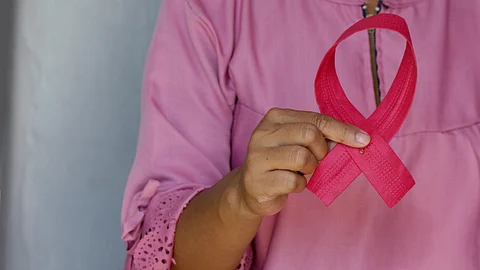

One-third of HER2-positive (HER2+) tumors express p95HER2, a protein linked to an aggressive and poor-prognosis form of breast cancer. Researchers from the Vall d'Hebron Institute of Oncology (VHIO) Growth Factors Group, in collaboration with the Cancer Research Program at Hospital del Mar Research Institute (HMRI) in Barcelona, have created a groundbreaking chimeric antigen receptor (CAR) T-cell therapy targeting this challenging subtype. The therapy demonstrates a potent antitumor response against cells expressing p95HER2.
The innovative CAR T-cell approach involves engineering T cells to express a receptor targeting p95HER2 while secreting the TECH2Me bispecific antibody. This antibody not only identifies tumor cells but also activates immune cells in the tumor microenvironment (TME). Preclinical evaluations in patient-derived models of HER2+ p95HER2-expressing solid tumors showed safety and sustained antitumor responses in a subset of cases. These findings, recently published in Nature Communications, pave the way for a first-in-human phase 1 clinical trial to assess the therapy's safety and effectiveness in HER2-overexpressing tumors.
This research was supported by the Spanish Association Against Cancer (AECC) and the Breast Cancer Research Foundation (BCRF), with contributions from AUSONIA and the Fundación BBVA CAIMI Program. Joaquín Arribas, head of VHIO's Growth Factors Group and HMRI director, led the study and has received funding for breast cancer research since 2007.
This advanced cell therapy has shown great success in hematologic cancers, but solid tumors present unique challenges.
Joaquín Arribas
CAR T-cell therapy, a form of adoptive cell transfer, involves modifying a patient’s T-cell lymphocytes to attack specific cancer cells. These engineered cells are multiplied in a lab and reintroduced into the patient’s bloodstream. While CAR T-cell therapy has proven effective in treating hematologic cancers, its application to solid tumors has faced significant hurdles.
“This advanced cell therapy has shown great success in hematologic cancers, but solid tumors present unique challenges,” said Joaquín Arribas.
HER2, a receptor playing a critical role in epithelial cell growth and differentiation, is overexpressed in about 4% of all tumors and 15% of breast cancers. HER2-positive cancers are often aggressive, associated with poor prognosis, and resistant to some conventional therapies. One-third of HER2+ breast cancers express p95HER2, an altered form of the receptor linked to more aggressive disease. This makes HER2 an important, albeit complex, target for therapeutic interventions.
Arribas highlighted HER2's centrality in cancer therapy development, noting, “While many therapies target HER2-positive tumors, a significant number of patients, particularly those with advanced HER2+ breast cancer, fail to respond to these treatments.
We designed CAR T-cells loaded with therapeutic components to enhance and sustain antitumor immune responses safely
Macarena Román
Researchers have developed advanced CAR T-cells specifically targeting the tumor-specific antigen p95HER2. Unlike HER2, p95HER2 is not expressed in normal tissues, making it a safer therapeutic target. These next-generation CAR T-cells are engineered to secrete the TECH2Me bispecific BiTE® antibody, which enhances the immune response within the TME while avoiding toxicity to healthy cells expressing normal HER2 levels.
Macarena Román, postdoctoral researcher and first author of the study, described the innovative strategy: “We designed CAR T-cells loaded with therapeutic components to enhance and sustain antitumor immune responses safely.”
In preclinical studies using in vitro and in vivo models, these CAR T-cells demonstrated complete tumor regression in patient-derived xenografts of HER2+ p95HER2-expressing breast cancer. Tumors shrank entirely in most mice, with no adverse effects on their quality of life.
“These preclinical results are promising, but phase 1 clinical trials will be crucial to confirm safety and efficacy in patients,” Román added.
The upcoming phase 1 trial, funded by AECC and Instituto de Salud Carlos III (ISCIII), aims to include 15 patients with HER2-driven tumors who have exhausted other treatment options. This trial could mark the beginning of a transformative approach for patients with aggressive HER2+ cancers.
CAR T-cell therapy has faced significant challenges in treating solid tumors due to the complexity of the TME and potential toxicity to healthy tissues. The novel approach developed by VHIO researchers addresses these challenges by combining tumor-specific targeting with immune system activation.
The TECH2Me bispecific antibody activates both CAR T-cells and other immune cells within the TME, enhancing the overall immune response. Additionally, the therapy's design minimizes risks of off-target effects, which have been a significant limitation of earlier CAR T-cell therapies for solid tumors.
While the preclinical findings are encouraging, they require validation in clinical settings. If successful, this strategy could revolutionize the treatment of HER2+ cancers, particularly for patients with limited options.
Supported by the Immune-Image European consortium and the Innovative Medicines Initiative 2 Joint Undertaking, this work is part of a larger effort to develop non-invasive imaging strategies for monitoring immune responses in oncology and inflammatory diseases.
Arribas concluded, “This work represents a step forward in harnessing the immune system against HER2-driven tumors, and we are optimistic about its potential to improve patient outcomes.”
Reference:
1. Alonso, R., et al. (2024). Generation of chimeric antigen receptor T cells targeting p95HER2 in solid tumors. Nature Communications. doi.org/10.1038/s41467-024-53265-7.
(Input from various sources)
(Rehash/Yash Kamble/MSM)
